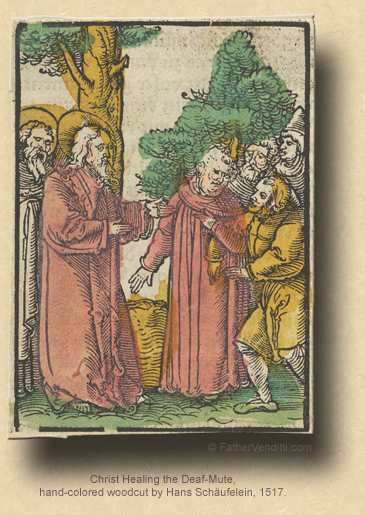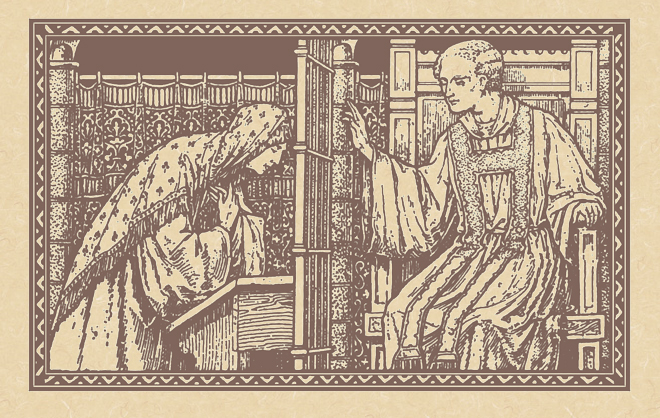Gird Yourselves and Weep, O Priests!
The Twenty-Seventh Friday of Ordinary Time; the Memorial of Saint Denis, Bishop, & His Companions, Martyrs; or, the Memorial of Saint John Leonardi, Priest.
Lessons from the primary feria, according to the ordinary form of the Roman Rite:
• Joel 1: 13-15; 2: 1-2.
• Psalm 9: 2-3, 6, 16, 8-9.
• Luke 11: 15-26.
The Third Class Feast of Saint John Leonardi, Confessor; and, the Commemoration of Saints Denis, Rusticus & Eleutherius, Martyrs.
Lessons from the proper, according to the extraordinary form of the Roman Rite:
• II Corinthians 4: 1-6, 15-18.
• Psalm 72: 21, 68, 10.
• Luke 10: 1-9.
The Nineteenth Friday after Pentecost; the Feast of the Holy Apostle James Alpheus; the Feast of Our Venerable Father Andronicus & His Wife, Athanasia; the Feast of Our Righteous Forefather Abraham & His Nephew, Lot; and, the Feast of the Holy Martyr Denis, Bishop of Paris.
First & third lessons from the pentecostarion, second & fourth from the menaion, according to the Ruthenian recension of the Byzantine Rite:*
• Phillipians 3: 8-19.
• I Corinthians 4: 9-16.
• Luke 7: 31-35.
• Luke 10: 16-21.
FatherVenditti.com
|
 1:12 PM 10/9/2015 — For some peculiar reason, today's Gospel lesson enters a narrative midstream. At the request of His disciples, our Lord had just driven out a demon from a man who was mute, which causes some consternation among some of those who had witnessed it, arising to the accusation that He's in league with the devil. Part of the problem rests with how the Jews of our Lord's time viewed sickness and handicap: a person was physically afflicted because of God's displeasure, which is a foreign concept to us, but very common in a superstitious time like that in which our Lord lived. And, while the Roman Missal seems to want us to focus on the devil as a subject of today's Mass, I chose to take a different approach. 1:12 PM 10/9/2015 — For some peculiar reason, today's Gospel lesson enters a narrative midstream. At the request of His disciples, our Lord had just driven out a demon from a man who was mute, which causes some consternation among some of those who had witnessed it, arising to the accusation that He's in league with the devil. Part of the problem rests with how the Jews of our Lord's time viewed sickness and handicap: a person was physically afflicted because of God's displeasure, which is a foreign concept to us, but very common in a superstitious time like that in which our Lord lived. And, while the Roman Missal seems to want us to focus on the devil as a subject of today's Mass, I chose to take a different approach.
In the Semitic culture of Palestine, a person was blind or deaf or lame or, in the case of the man just cured leading up to today's Gospel lesson, mute because he had sinned or, if he was born that way, because of a sin inherited from his parents. Remember, when our Lord encountered the man born blind, His own disciples asked him, "Rabbi, who has sinned, this man or his parents, that he should be born blind?" (John 9: 2 Douay-Rheims). And the cures that Jesus brings about on these occasions, in addition to simply being done to help someone in need, are most definitely intended by our Lord to represent the spiritual healing that He comes to effect in our lives.
Keeping this clearly in mind as we read the Holy Gospels, we cannot help but notice that, in the way Jesus acts toward the sick, He is giving us an image of the sacraments. St. John Chrysostom, commenting on today's Gospel lesson, tells us that this man “was unable to present his request himself, because he was dumb; he was unable to ask others to do it either, because the devil had tied his tongue, and together with his tongue he had bound up his soul” (Homilies on the Gospels, 32, 1).
How many times have we left the confessional only to remember later that there was something we needed to say to our Lord, but had forgotten to say it? More common, perhaps, is the phenomenon rooted as much in psychology as in spirituality, wherein someone will go to confession with every intention of making a clean breast of everything, but simply can't get it out: maybe they're embarrassed; maybe the sin occurred in the midst of some traumatic experience that the individual finds difficult to relive; maybe it's just been so many years since someone confessed that he's afraid of what the priest will say, forgetting that he's not telling his sins to the priest, he's telling them to Christ. Priests I know who work in the Marriage Tribunal of our diocese tell me that one of the reasons petitions for decrees of nullity often take so long to process and bring to judgment is not because of some kind of slowness on the part of the Tribunal, but because the petitioner often takes a long time to collect the necessary information, because part of the process requires them to put down on paper, in excruciating detail, all the horrors that brought about the dissolution of the marriage, and people have a hard time plowing through the emotions required to do that; no one wants to relive the most heart-breaking part of his or her life.
In the Divine Office, every morning the priest prays what's called the Invatatory Psalm, which is Psalm 95:
Oh, that today you would hear his voice:
“Harden not your hearts as at Maribah,
as in the day of Massah in the desert,
Where your fathers tempted me;
they tested me though they had seen my works” (Psalm 95: 8-9 NABRE).
The historical reference is to events recorded in Exodus 17 (cf. v. 7); but, applying it to the context of today's Mass, it refers not to a hardening of one's heart as a result of obstinacy; it's a hardness brought about by a lacking in the virtues of Faith and Hope: we either doubt the Truth of the Faith, that Christ can and does forgive our sins in confession, or we presume against our Lord's infinite mercy and doubt our Lord's desire to do so. And here is where the Devil comes into play, and why so much is said about him in today's lesson, and why he has caused a man to become mute: the result of this fear and presumption is silence, preventing us from going into the confessional at all, or, once we're in there, preventing us from speaking what needs to be spoken. This, of course, serves the Devil's purpose, because a sin not confessed is a sin not forgiven.
Now, it is a fact that, if our emotional state is such that we fail to speak a sin in confession because we simply can't muster the courage to do it, our Lord, who knows all our sins from the get-go, makes up for that handicap and forgives the sin anyway, which is why it's not necessary to run back to confession the next day or the next hour to try it again; it's simply sufficient, the next time one goes to confession, to mention what happened. And it doesn't matter how long it's been, or how terrible we think the sin may be.
“Gird yourselves and weep, O priests! wail, O ministers of the altar! Come, spend the night in sackcloth, O ministers of my God!” (Joel 1: 13 RM3), from the Book of the Prophet Joel in today's first lesson. Not a bad prayer for any priest going into the confessional. An even better prayer for the penitent going into the confessional would be Psalm 9, today's Responsorial Psalm: “The Lord rules forever, has set up his throne for judgment. / It is he who judges the world with justice, who judges the peoples with fairness” (Psalm 9: 8-9 NABRE).

* The second & third lessons are for the Apostle James; there are no lessons prescribed for the other saints.
|

